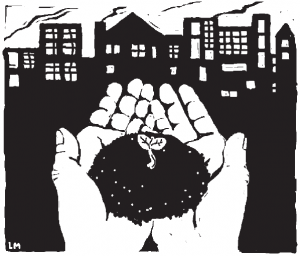Reading the news lately about mankind’s continued assault on the earth’s climate can easily leave one feeling disheartened. The Trump administration’s attack on science, its reflexive support of fossil fuel industries, and its total denial of the climatic consequences of business-as-usual, is nothing less than immoral abdication of our responsibility to our children and the other creatures with whom we share the earth.
Recent setbacks on progress
In France, strong opposition forced President Macron to retreat from his proposal to reduce fossil fuel reliance by adding new taxes on gasoline. We’ve recently learned that, contrary to promises made in Paris, CO2 emissions from most countries, which had been falling slowly, are again increasing. And particularly frustrating here in Washington State was the second defeat in as many elections of an initiative (I-1631) that would have taxed carbon emissions and put our state in the vanguard of a clean energy future.
The climate crisis is such a multi-faceted problem that we’ll need multiple approaches |
Thinking and acting strategically
A few ideas have emerged to help us understand why I-1631 failed. Clearly, the vast sums spent on negative advertising by oil and gas interests played a part. And although awareness of the climate crisis is high, taxes are unpopular even here in Washington, particularly when the benefits of those taxes are intangible and not necessarily local. The same electorate passed other progressive measures, but voted down two that contained additional taxes in support of progressive policies.
What to do now? Above all, keep working hard and strategically, and don’t lose hope. Part of maintaining hope is taking responsibility for actions we perform daily. Another part is supporting efforts in our local communities. In Olympia, for example, the Thurston Climate Action Team is particularly active and worthy of support.
Getting behind a fee-and-dividend approach
Still, to avert the worst of the costs flowing from the changing climate, we need policy on a larger scale. Thus, it was heartening to learn in November, 2018, of the introduction in Congress of the “Energy Innovation and Carbon Dividend Act.” The bill is sponsored by both Democrats and Republicans, and represents a forward-looking, achievable, and tangible action we can all get behind: gradually but inexorably increasing the costs of carbon pollution while providing citizens, businesses, and governments with funds to transition to clean energy.
In short, the bill would impose a fee of $15/ton, at the most upstream possible site, on substances emitting carbon into the atmosphere. The fee would increase $10/year, providing predictability for businesses and governments, and a gradually tightening noose on carbon polluters thus tilting the playing field toward clean energy. The bill is currently labelled HB 7173 and a similar, bipartisan bill has been introduced in the Senate.
Well-aligned incentives
Because fossil fuels can’t disappear overnight, and because we’d all be paying more for goods produced from them, such a fee in isolation would be both regressive and unpopular (and unsustainable). Thus, the bill returns revenues collected (minus modest administrative costs) to each of us in the form of a dividend.
In short, your cost of consuming fossil fuels and related products would rise, but the government would send you a check related to that cost. Because the dividend would be the same for us all, those using relatively less fossil fuel would end up ahead, while those with larger carbon footprints would expend more than their dividend.
Governments and businesses would face the same economic logic, thus motivating support for innovation in renewables, and the most painless possible transition away from carbon pollution.
Other strategic elements of HB 7173
HB 7173 also includes a border adjustment to discourage outsourcing of carbon pollution and encourage countries not yet ramping off carbon pollution to join us. The current bill also exempts fuels used specifically in farming, which should blunt opposition from powerful agricultural interests. This may be seen as regrettable, but is a reasonable accommodation that will only modestly diminish the speed with which carbon pollution is reduced while garnering support in a sector that would typically be opposed. With time, the development of energy-efficient or carbon-free technology hastened by the fee-and-dividend should allow the agricultural sector to reduce their emissions well.
Not the be-all and end-all but a crucial start
Unlike 1631, HB 7173 doesn’t create a fund to support innovative green projects – but no single bill does everything one might like. The climate crisis is such a difficult, multi-faceted problem that we’ll need multiple approaches. It would be counterproductive to criticize any one measure because it doesn’t provide a fully comprehensive solution. We need a large toolbox to reform our economy from the one creating our current climate crisis: the carbon fee and dividend in HB 7173 will be a vitally important tool.
A key role for citizens
Let’s all urge all members of Washington’s Congressional Delegation to join the current co-sponsors of 7173 and its companion in the Senate, and dedicate ourselves to getting it enacted. Citizens’ Climate Lobby, a national group with 501 active local chapters everywhere (including Olympia) and influence in Congress, is working hard and leading the charge. The headwinds in D.C. remain strong, but social change often seems impossible until the dam suddenly breaks when the public has spoken with sufficient force.
Rich Harris lives in Olympia with his wife, and works at the Department. of Fish and Wildlife. He has also lived in Montana and the Tibetan Plateau of Western China. He is active with the Olympia Chapter of Citizen’s Climate Lobby. In his copious spare time, Rich attempts to tame his French horn.
Contact Thurston Climate Action at http://www.thurstonclimateaction.org/ Other organizations working on this issue are Citizen’s Climate Lobby, Creation Care and Our Climate.

Be First to Comment